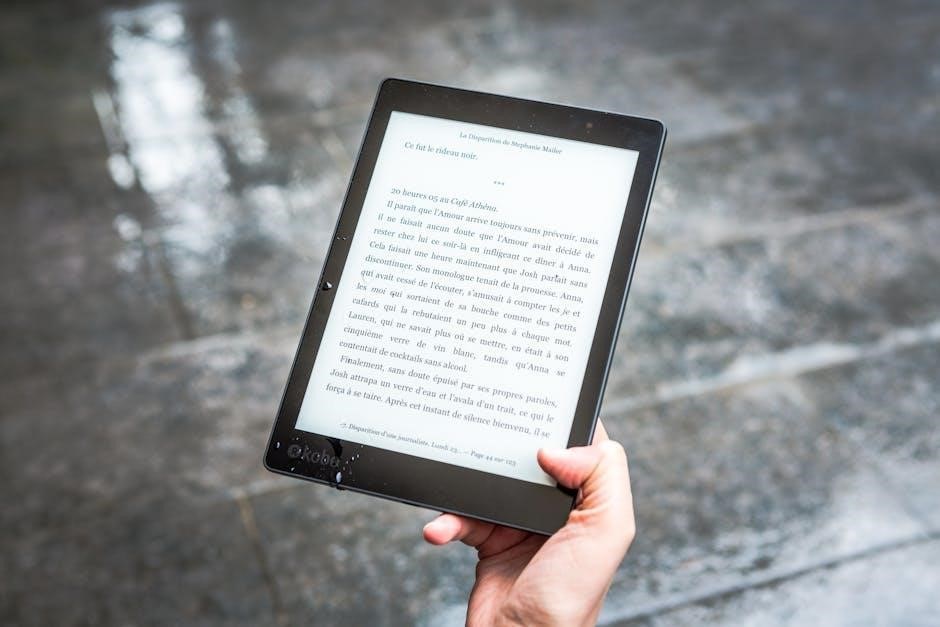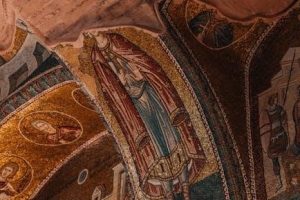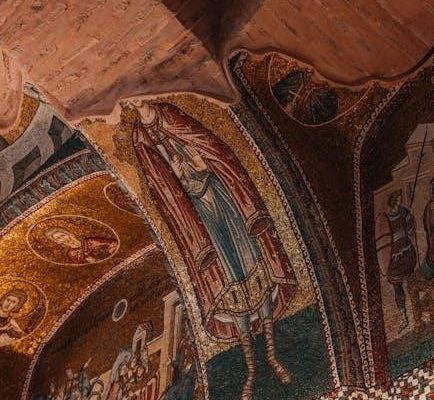Plato’s Gorgias is a profound dialogue exploring rhetoric, persuasion, and justice, featuring Socrates, Gorgias, and other thinkers. It examines the ethical implications of rhetorical power and its societal impact.
1.1 Overview of the Dialogue
Plato’s Gorgias is a Socratic dialogue that delves into the nature of rhetoric, justice, and power. It begins with Socrates questioning Gorgias about his art, leading to debates with Polus and Callicles. The dialogue critiques rhetoric’s misuse for personal gain, advocating for ethics over manipulation. Available as a PDF, it includes the original Greek text, translations, and scene descriptions, offering insights into Plato’s philosophical arguments on persuasion, morality, and the ideal society.
1.2 Historical Context and Significance
Gorgias, written in the late 5th century BC, is one of Plato’s most influential dialogues, exploring rhetoric’s role in society. It reflects the intellectual tensions of ancient Greece, where rhetoric was both admired and criticized. The dialogue is significant for its critique of rhetorical manipulation and its advocacy for ethical discourse. As a PDF, it remains a vital resource, offering insights into Plato’s philosophy and the historical context of rhetorical practices, making it essential for understanding the evolution of philosophical thought on persuasion and justice.

Key Themes in Gorgias
Plato’s Gorgias delves into rhetoric, persuasion, justice, and the clash between knowledge and opinion, scrutinizing the ethical implications of rhetorical power in shaping societal discourse and morality.
2.1 The Nature of Rhetoric and Persuasion

In Gorgias, Plato examines rhetoric as a powerful tool for persuasion, questioning its moral foundation. Gorgias defines rhetoric as the art of persuasion, capable of influencing public opinion without necessarily conveying truth. Socrates challenges this view, arguing that true rhetoric must align with justice and morality. The dialogue critiques the manipulation of emotions and highlights the distinction between genuine knowledge and mere persuasion, emphasizing the ethical responsibility of rhetoricians in society.
2.2 Ethics and Justice in Rhetorical Practice
Plato’s Gorgias delves into the ethical dimensions of rhetoric, questioning its alignment with justice. Gorgias and Polus defend rhetoric as a neutral tool for persuasion, while Socrates argues that it must serve morality. Callicles suggests rhetoric empowers individuals to impose their will, raising ethical concerns. Socrates critiques the misuse of rhetoric for personal gain, advocating for its role in promoting justice and the common good. The dialogue underscores the tension between persuasion and ethical responsibility, urging rhetoricians to prioritize truth and morality over manipulation.
2.3 Knowledge vs. Opinion: The Socratic Perspective
Socrates distinguishes true knowledge from mere opinion, arguing that rhetoric without knowledge is hollow. He contends that persuasion based on opinion lacks truth, while knowledge aligns with justice and the good. In Gorgias, Socrates criticizes rhetorical practices that prioritize convincing over enlightening, emphasizing that true wisdom lies in understanding justice and truth. This philosophical stance underscores the ethical imperative for rhetoric to serve knowledge, not manipulate emotions or spread falsehoods, reflecting Socrates’ commitment to reason and moral clarity.

Structure and Characters
Gorgias features Socrates, Gorgias, Polus, and Callicles, with the dialogue structured into three acts, each advancing the argument on rhetoric, justice, and knowledge versus opinion.
3.1 Main Characters: Socrates, Gorgias, Polus, and Callicles
The dialogue centers around four key figures: Socrates, the philosopher; Gorgias, the renowned rhetorician; Polus, his ambitious student; and Callicles, a pragmatic Athenian. Each character represents distinct perspectives on rhetoric, justice, and power. Socrates critically examines the ethical implications of rhetoric, while Gorgias defends its value as an art of persuasion. Polus and Callicles challenge Socrates with differing views, shaping the dialogue’s philosophical depth and tension. Their interactions drive the exploration of rhetoric’s societal role and moral dimensions.
3.2 The Dialogue’s Three Acts: Progression of Argument
The dialogue unfolds in three acts, each advancing the philosophical debate. Act 1 introduces Gorgias, who defines rhetoric as the art of persuasion, while Socrates questions its ethical implications. Act 2 shifts to Polus, who defends rhetoric as a means of power, leading to a confrontation with Socrates over justice and morality. Act 3 engages Callicles, exploring the tension between individual desire and societal norms, culminating in Socrates’ argument for the supremacy of ethical rhetoric; Each act escalates the debate, revealing deeper truths about rhetoric’s role in society.

The Role of Rhetoric in Society
Gorgias views rhetoric as a powerful tool for civic influence, enabling speakers to shape public opinion and achieve their goals. Socrates critiques its potential ethical misuse.
4.1 Gorgias’ Definition of Rhetoric
Gorgias defines rhetoric as the art of persuasion, emphasizing its power to influence audiences and achieve desired outcomes. He views it as a civic art, essential for public discourse, enabling speakers to sway opinions effectively. Gorgias’ rhetoric focuses on the ability to convince without necessarily imparting knowledge, distinguishing it from dialectic. This definition underscores rhetoric’s role in shaping societal dynamics and governance, highlighting its practical applications in civic life.
4.2 Critique of Rhetoric as a Means of Power
Socrates critiques rhetoric as a tool for power, arguing that it prioritizes persuasion over truth and justice. He contends that rhetoric, when divorced from ethics, can manipulate emotions and exploit ignorance, enabling those in power to further their interests. This critique highlights the potential for rhetoric to be misused, emphasizing the need for moral accountability in its practice. Socrates’ examination challenges the notion of rhetoric as a neutral art, instead framing it as a force that must align with justice to serve the common good.

The PDF Version of Gorgias
The PDF of Plato’s Gorgias is widely available online, offering the original Greek text, translations, and analyses of the dialogue’s themes and structure for scholarly study.

5.1 Features of the PDF: Translation and Original Text
The PDF version of Gorgias includes the original Greek text alongside its English translation, providing scholars with a comprehensive resource for comparative analysis. Translated by Benjamin Jowett, the dialogue maintains its philosophical depth while ensuring accessibility. The PDF also features annotations, scene descriptions, and character listings, enhancing understanding of the dialogue’s structure and themes. This bilingual format allows readers to engage with Plato’s arguments in their original form while benefiting from a clear and faithful translation.
- Original Greek text for authenticity
- English translation by Benjamin Jowett
- Scene and character descriptions
- Annotations for deeper analysis
5.2 Where to Access the Gorgias PDF Online
The Gorgias PDF is widely available online through platforms like archive.org, Google Books, and academic repositories. It features the original Greek text, Benjamin Jowett’s translation, and scene descriptions. Users can download or view it for free, making Plato’s dialogue accessible to scholars and enthusiasts alike. The PDF is often bundled with other works by Plato, offering a comprehensive philosophical resource.
- Available on archive.org
- Accessible via Google Books
- Includes original Greek text
- Features Benjamin Jowett’s translation
- Free to download or view
Gorgias critiques rhetoric’s misuse, emphasizing truth and justice over persuasion for personal gain. Socrates argues that true rhetoric aligns with virtue, challenging immoral power dynamics.
The dialogue remains pivotal in philosophical discourse, highlighting ethical communication’s importance in leadership and society.
6.1 Major Arguments and Their Implications
The dialogue centers on Socrates’ critique of rhetoric as mere persuasion without knowledge. He argues that true rhetoric must align with justice and virtue, rejecting its use for personal gain.
Gorgias and Polus defend rhetoric as a powerful tool, while Callicles introduces nihilistic views, sparking debates on morality and power.
Socrates’ arguments highlight the ethical dangers of rhetoric, emphasizing the importance of truth and justice in persuasion.
6.2 Relevance of Gorgias in Modern Philosophical Discourse
Plato’s Gorgias remains highly relevant in modern philosophy, particularly in discussions about rhetoric, ethics, and power. Its exploration of persuasion’s relationship with truth and justice resonates in contemporary debates on media, politics, and communication. The dialogue’s critique of rhetoric as a tool for manipulation aligns with modern concerns about misinformation and ethical communication. Socrates’ emphasis on aligning speech with virtue and knowledge continues to inspire reflections on the responsibilities of public discourse in democratic societies.
Plato’s Gorgias is a timeless exploration of rhetoric, justice, and the pursuit of truth, offering insights into the ethical use of persuasion. Its themes remain relevant today.
7.1 Final Thoughts on the Dialogue’s Significance
Plato’s Gorgias remains a cornerstone of philosophical inquiry, offering profound insights into the ethical dimensions of rhetoric. It critiques the manipulation of language for power and advocates for truth and justice. By contrasting rhetoric with dialectics, Plato underscores the importance of pursuing knowledge over mere persuasion. The dialogue’s enduring relevance lies in its exploration of moral responsibility in communication, making it a vital text for understanding the interplay between speech, ethics, and society. Its lessons continue to resonate in contemporary debates about the role of rhetoric in public life.

7.2 The Enduring Legacy of Gorgias in Philosophy
Plato’s Gorgias has left an indelible mark on Western philosophy, shaping debates on rhetoric, ethics, and epistemology. Its critique of rhetoric as a tool for manipulation rather than truth-seeking continues to influence contemporary thought. The dialogue’s emphasis on the pursuit of justice and the distinction between knowledge and opinion remains central to philosophical inquiry. As a foundational text, it has inspired countless scholars and philosophers, ensuring its relevance in modern discussions about communication, morality, and the role of rhetoric in society. Its legacy endures as a timeless critique of power and persuasion.






